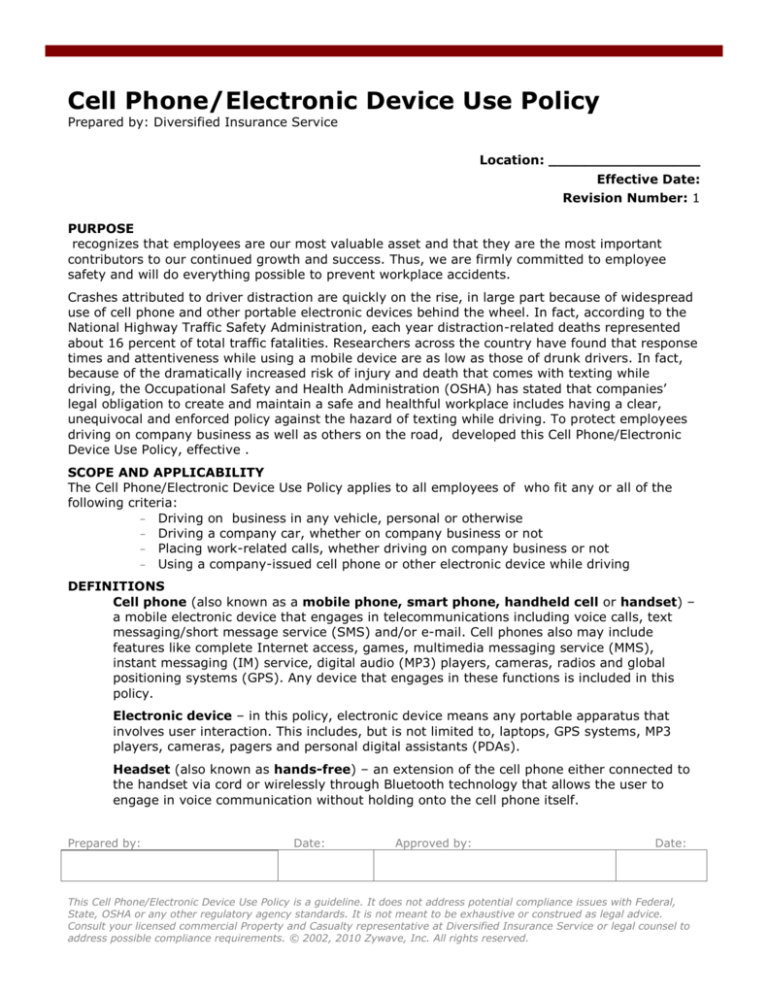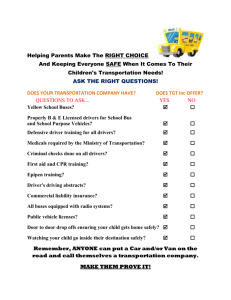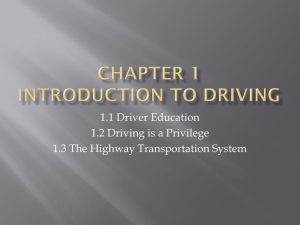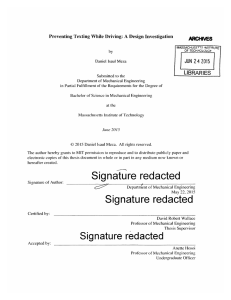
Cell Phone/Electronic Device Use Policy
Prepared by: Diversified Insurance Service
Location: _________________
Effective Date:
Revision Number: 1
PURPOSE
recognizes that employees are our most valuable asset and that they are the most important
contributors to our continued growth and success. Thus, we are firmly committed to employee
safety and will do everything possible to prevent workplace accidents.
Crashes attributed to driver distraction are quickly on the rise, in large part because of widespread
use of cell phone and other portable electronic devices behind the wheel. In fact, according to the
National Highway Traffic Safety Administration, each year distraction-related deaths represented
about 16 percent of total traffic fatalities. Researchers across the country have found that response
times and attentiveness while using a mobile device are as low as those of drunk drivers. In fact,
because of the dramatically increased risk of injury and death that comes with texting while
driving, the Occupational Safety and Health Administration (OSHA) has stated that companies’
legal obligation to create and maintain a safe and healthful workplace includes having a clear,
unequivocal and enforced policy against the hazard of texting while driving. To protect employees
driving on company business as well as others on the road, developed this Cell Phone/Electronic
Device Use Policy, effective .
SCOPE AND APPLICABILITY
The Cell Phone/Electronic Device Use Policy applies to all employees of who fit any or all of the
following criteria:
- Driving on business in any vehicle, personal or otherwise
- Driving a company car, whether on company business or not
- Placing work-related calls, whether driving on company business or not
- Using a company-issued cell phone or other electronic device while driving
DEFINITIONS
Cell phone (also known as a mobile phone, smart phone, handheld cell or handset) –
a mobile electronic device that engages in telecommunications including voice calls, text
messaging/short message service (SMS) and/or e-mail. Cell phones also may include
features like complete Internet access, games, multimedia messaging service (MMS),
instant messaging (IM) service, digital audio (MP3) players, cameras, radios and global
positioning systems (GPS). Any device that engages in these functions is included in this
policy.
Electronic device – in this policy, electronic device means any portable apparatus that
involves user interaction. This includes, but is not limited to, laptops, GPS systems, MP3
players, cameras, pagers and personal digital assistants (PDAs).
Headset (also known as hands-free) – an extension of the cell phone either connected to
the handset via cord or wirelessly through Bluetooth technology that allows the user to
engage in voice communication without holding onto the cell phone itself.
Prepared by:
Date:
Approved by:
Date:
This Cell Phone/Electronic Device Use Policy is a guideline. It does not address potential compliance issues with Federal,
State, OSHA or any other regulatory agency standards. It is not meant to be exhaustive or construed as legal advice.
Consult your licensed commercial Property and Casualty representative at Diversified Insurance Service or legal counsel to
address possible compliance requirements. © 2002, 2010 Zywave, Inc. All rights reserved.
PROCEDURES
The following procedures apply to all employees falling under the conditions outlined above in
SCOPE AND APPLICABILITY.
State Laws
is not responsible for any traffic violations or parking tickets acquired by violation of city
ordinance, state or federal laws regarding your driving habits and operation of your motor
vehicle. Any ticket issued is the employee’s responsibility, even if the ticket is issued while
conducting business for .
Note that cell phone driving laws vary greatly by state, and it is the employee’s
responsibility to be familiar with and abide by such laws. This is especially important for
employees who travel on company business. Some states have laws banning all drivers
from talking on handsets but permit the use of headsets, including Washington, Oregon,
California, Utah, New York, Connecticut, New Jersey, Delaware, Maryland and the District of
Columbia. Others have laws prohibiting text messaging (sending, receiving and reading)
while behind the wheel, including Alaska, Washington, Oregon, California, Utah, Wyoming,
Colorado, Nevada, Kansas, Minnesota, Iowa, Arkansas, Louisiana, Wisconsin, Illinois,
Kentucky, Tennessee, Michigan, Georgia, Virginia, North Carolina, New York, Vermont, New
Hampshire, Massachusetts, Rhode Island, Connecticut, New Jersey, Delaware, Maryland and
the District of Columbia.
As of November 2010, except for novice drivers and drivers of school buses, no state has
completely banned all types of cell phone use (handheld and hands-free); however, all
employees must comply with the company Cell Phone/Electronic Device Use Policy on top of
abiding by any state or local regulations addressing the matter.
Commercial Truck Drivers
Federal legislation prohibits drivers operating Commercial Motor Vehicles (CMV) from
texting using electronic devices, and provides sanctions including fines and possible license
suspension for drivers convicted of texting while operating CMVs.
For CMV drivers, texting includes:
- Short message service
- E-mailing
- Instant messaging
- Commands or requests to access a website
- Engaging in any other form of electronic text retrieval or electronic text entry for
present or future communication.
Texting does not include:
- Reading, selecting or entering a telephone number, an extension number or
voicemail retrieval codes and commands into an electronic device to make or receive
a telephone call
- Using voice commands to make or receive a telephone call
- Inputting, selecting or reading information on a global positioning system or
navigation system
- Using a device capable of performing multiple functions (such as fleet management
systems, dispatching devices, smart phones, citizens band radios and music players)
for purposes other than texting
All drivers must follow these federal regulations.
General Procedures
- Use of cell phones while driving is strictly prohibited – this includes all functions of
the cell phone including, but not limited to, phone calls, text messaging/SMS, e-mail,
MMS, Internet use, camera use, etc.
- Use of electronic devices – including laptops, PDAs, cameras and pagers – while
driving is strictly prohibited unless specifically outlined below
2|Cell Phone/Electronic Device Use Policy
-
Voicemail must handle all calls while driving, and calls may only be returned when
stopped or pulled off the road
Passengers making or taking calls for the driver is permissible provided the
interaction does not affect the driver’s performance
Regular callers must be informed that you will not be available while driving and
should be notified of the best times to call based on driving schedule
Employees who receive calls from co-workers who are driving are obligated to ask
that the co-worker call back at a more appropriate time
Headset/Hands-Free Use
The use of headsets or hands-free devices while driving is permissible IF:
- Device is pre-approved by for use
- Use of the device does not cause distraction (i.e., fiddling with the device or taking
eyes off road to get it to function properly)
- Any dialing or use of the handset is handled while stopped or pulled to the side of the
road
- Conversations do not interfere with the driver’s ability to drive safely
- Road conditions are generally good and do not threaten your safety
Emergency Calls
The only exception to the cell phone use policy is calls placed to 911. If placing or accepting
an emergency call, keep it short and use a hands-free option if available. Pull over if
practicable.
GPS Systems
understands that sometimes, especially when traveling in unfamiliar areas, drivers require
assistance with directions. GPS systems are extremely helpful devices, but they can also be
distracting if used improperly. Employees must adhere to the following:
- Mounted GPS systems may not block or obstruct the driver’s view in any way
- GPS systems must be voice narrated and must not require that the driver look away
from the road to follow instructions
- Employees may not program the system while in motion
- Programming or otherwise engaging with the GPS screen may only occur while
stopped or while pulled off the road
MP3 and Other Audio Devices
In some cases, worrying about music selection or touching dials and buttons on the radio,
MP3 player or other audio device may be just as dangerous as cell phone use. It takes eyes
and concentration off the road, which is not permissible under this policy. does allow
employee use of personal, portable audio devices. However, while the company does not
want to eliminate employees’ ability to enjoy music while behind the wheel, certain
guidelines are in place:
- Employees may not take eyes off the road to adjust music settings
- Programming music settings while stopped, pulled off the road or before departing is
permissible behavior
- Employees may not under any circumstances use MP3 players or other handheld
electronic audio devices with headphones – not only is it illegal in most states, it also
impedes the driver’s ability to properly hear warning signs, signals or sirens
3|Cell Phone/Electronic Device Use Policy
Cell Phone/Electronic Device Use Policy
The No. 1 on-the-job fatality is transportation incidents, and at , it is our job to enforce procedures
that mitigate this risk. It is for your safety, as well as the safety of everyone else on the road, that
the company has put this Cell Phone/Electronic Device Use Policy in place.
All employees are expected to understand when this policy applies and follow all procedures. As
technology evolves, also expects employees to use common sense and err on the side of caution
when assessing electronic device use while driving. The company encourages all employees to take
a proactive approach to road safety, so expects employees to report any problems or known
violations of this policy to their supervisor.
Prior to working on any job site, each employee is expected to have read the entire Cell
Phone/Electronic Device Use Policy, which includes
Purpose
Scope and Applicability
Definitions
Procedures
State Laws
General Procedures
Headset/Hands-Free Use
Emergency Calls
GPS Systems
MP3 and Other Audio Devices
If you have any uncertainty or questions regarding the content of these policies, you are required
to consult your supervisor. This should be done prior to signing and agreeing to the Cell
Phone/Electronic Device Use Policy.
I have read and understand ’s Cell Phone/Electronic Device Use Policy, and I understand the
requirements and expectations of me as an employee. I agree to adhere to all provisions and
procedures outlined in the policy, and I understand that failure to do so will result in discipline up
to and including termination.
Employee Signature: __________________________________________
Date: ____________________________
1|Cell Phone/Electronic Device Use Policy
Appendix A
Vehicle Use Policy
1|Cell Phone/Electronic Device Use Policy
Vehicle Use Policy
This policy applies to all drivers, including:
-
Vehicles owned, leased or rented to
-
Personally owned vehicles driven by employees on behalf of
The following procedures have been established to encourage safe operation of vehicles
and to clarify insurance issues relating to and its drivers:
-
All drivers must adhere to safety policies including the Vehicle Use Policy and Cell
Phone/Electronic Device Use Policy
-
All drivers must have a valid driver’s license
-
will check Motor Vehicle Records periodically – driving privileges may be suspended
or terminated if your record indicates an unacceptable number of accidents or
violations
-
Should your record fall into our insurance carrier’s guidelines of an “unacceptable
driver,” your employment may be terminated
-
Your supervisor must be notified of any change in your license status or driving
record
When operating your own vehicle for business:
-
Your personal auto liability insurance is the primary payer – ’s insurance is in excess
of your coverage
-
You should carry at least $300,000 per occurrence liability coverage
-
You must provide evidence of insurance coverage to each year via either a copy of
your policy’s declaration page or a certificate of insurance
-
is not responsible for any physical damage to your vehicle – you must carry your
own collision and comprehensive coverage
-
You must accurately and truthfully report mileage for expense reimbursement
In the event of an accident, you must:
-
Take necessary steps to protect your life or the lives of others around you
-
Comply with police instructions
-
Not assume or admit fault – professionals will determine liability and negligence after
thorough investigation
-
Report the accident to as soon as possible
I have read and understood the provisions of the Vehicle Use Policy and I agree to comply with all
the listed requirements.
______________________________________
Employee’s Signature
________________
Date
2|Cell Phone/Electronic Device Use Policy



